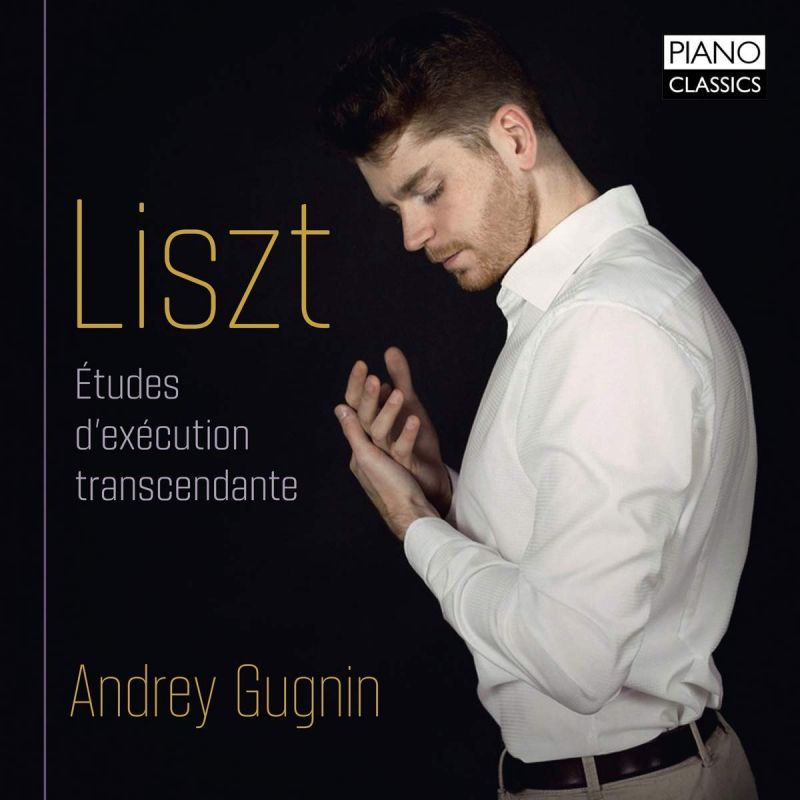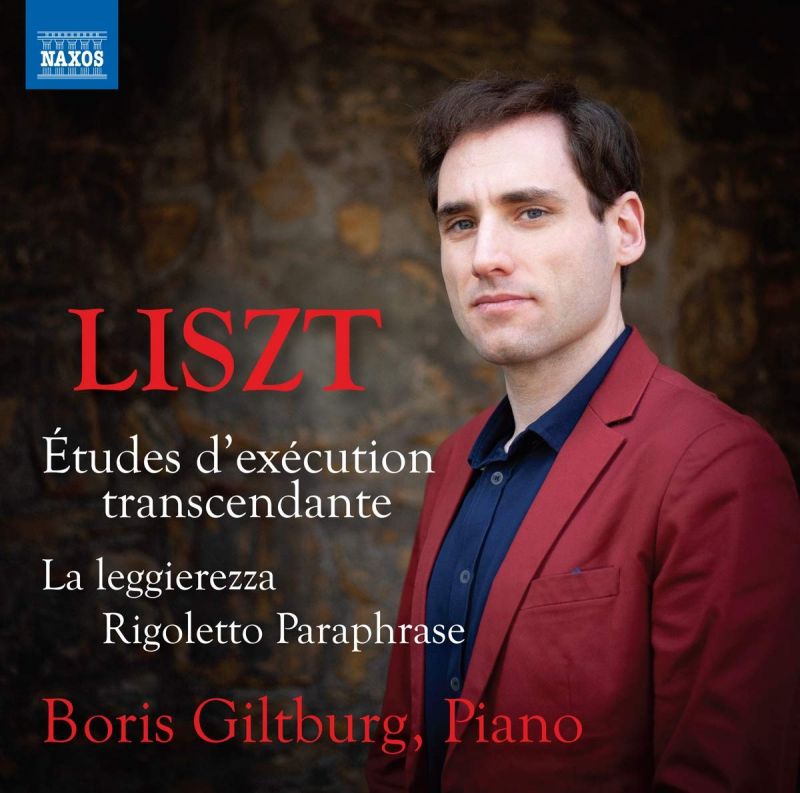LISZT Études d’exécution transcendante (Gugnin; Giltburg)
View record and artist detailsRecord and Artist Details
Composer or Director: Franz Liszt
Genre:
Instrumental
Label: Piano Classics
Magazine Review Date: 03/2019
Media Format: CD or Download
Media Runtime: 66
Mastering:
DDD
Catalogue Number: PCL10158

Tracks:
| Composition | Artist Credit |
|---|---|
| (12) Etudes d'exécution transcendante |
Franz Liszt, Composer
Andrey Gugnin, Piano Franz Liszt, Composer |
Composer or Director: Franz Liszt
Genre:
Instrumental
Label: Naxos
Magazine Review Date: 03/2019
Media Format: CD or Download
Media Runtime: 80
Mastering:
DDD
Catalogue Number: 8 573981

Tracks:
| Composition | Artist Credit |
|---|---|
| (12) Etudes d'exécution transcendante |
Franz Liszt, Composer
Boris Giltburg, Piano Franz Liszt, Composer |
| (3) Concert Studies, Movement: No. 2, La leggierezza |
Franz Liszt, Composer
Boris Giltburg, Piano Franz Liszt, Composer |
| Rigoletto (Verdi) Paraphrase |
Franz Liszt, Composer
Franz Liszt, Composer |
Author: Patrick Rucker
Between 1956 and 1958, Alexander Borovsky, Gunnar Johansen and György Cziffra recorded the first complete sets of the Transcendentals. Thereafter the field gradually widened, with notable accounts by Berman, Kentner, Bolet, France Clidat, Russell Sherman and Arrau. From the mid-1990s, however, a surprising number of young pianists chose to make their recording debuts with the Transcendentals, including impressive accounts by Claire-Marie Le Guay, Bertrand Chamayou, Alice Sara Ott and Mariangela Vocatello. More recently, the recordings of Daniil Trifonov and Kirill Gerstein have been particularly esteemed. Last year distinctive new versions of the Transcendentals were recorded by two pianists still in their early thirties: the Russian Andrey Gugnin and the Russian-born Israeli Boris Giltburg.
Giltburg needs no introduction. His series of warmly received recordings, particularly of Rachmaninov, not to mention his victory at the 2013 Queen Elisabeth, has secured him a deservedly prominent place on the map. Despite the considerable excitement at the prospect of his Transcendentals, I must confess a degree of disappointment.
From the ‘Preludio’ we are confronted with Giltburg’s penchant for beginning figurations and phrases slowly, then gradually accelerating. This is of course a useful and characteristic agogic strategy but, as the Études unfold, Giltburg indulges it so frequently that it seriously undermines rhythmic stability and impedes the long line.
‘Paysage’, on the other hand, is meltingly lyrical, with compelling voice-leading and a beautiful cantabile. ‘Feux follets’ has all the delicate precision of a fine mechanical watch, exuding a feathery lightness. ‘Wilde Jagd’ is remarkably crisp and ‘Mazeppa’ is a model of clarity. Yet the Lisztian recitatives, whether near the end of ‘Mazeppa’ or the introduction to ‘Ricordanza’, seem to lack the impetus of declamation and thus come off as oddly directionless. Elsewhere in ‘Ricordanza’, crescendos seem rigidly tied to accelerandos and, for all its pianissimo intimacy, repeated iterations in the étude strike as more desultory than ardent. As the series draws to a close with ‘Harmonies du soir’ and ‘Chasse-neige’ a certain guardedness seems to emerge, leaving the impression of a calculated caution that inhibits passion taking wing.
Less well known than Giltburg, Andrey Gugnin’s credentials include prizes at the 2013 Beethoven Competition and the Gina Bachauer in 2014, leading up to the first prize in Sydney in 2016, in addition to not inconsiderable exposure on YouTube. Nevertheless, Gugnin’s new disc is nothing short of disarming. This is some of the finest Liszt-playing one is likely to encounter these days, rich with affective contrasts, pliant and organic rubato, an exquisitely calibrated dynamic spectrum and a beguiling cantabile that speaks simply and directly.
The second Étude in A minor is taken at a true molto vivace, making the prestissimo midway through seem a shift into warp speed, all achieved with the utmost delicacy of touch and beautifully shaped phrases. Atmospheric mystery shrouds the beginning of ‘Vision’, rendering the turn to the major an apotheosis, grand and inevitable. Gugnin’s inerrant rhythmic sense allows the straight-spined pride of ‘Eroica’ to strut with captivating swagger. ‘Feux follets’ runs like quicksilver in a sparkling equipoise of virtuosity and evocative conjury.
Gugnin’s aural imagery is so fecund that one readily imagines the fierce hunting scenes of Delacroix in ‘Wilde Jagd’ or a Turner snow storm in ‘Chasse-neige’. His spacious, unhurried ‘Ricordanza’ recalls ardent love with true nostalgic eloquence, while the opening bars of ‘Harmonies du soir’ suggest lengthening shadows at sunset. And this orchestrally conceived ‘Mazeppa’, better experienced than described, leaves no doubt that it was in fact the horse that died in the end, not the pianist.
Gugnin’s cultivated pianissimo presto leggiero, imperturbable rhythmicality, his preference for the heroic over the melodramatic, and not least his wealth of poetic imagination, easily place him in elite company
Discover the world's largest classical music catalogue with Presto Music.

Gramophone Digital Club
- Digital Edition
- Digital Archive
- Reviews Database
- Full website access
From £8.75 / month
Subscribe
Gramophone Full Club
- Print Edition
- Digital Edition
- Digital Archive
- Reviews Database
- Full website access
From £11.00 / month
Subscribe
If you are a library, university or other organisation that would be interested in an institutional subscription to Gramophone please click here for further information.




